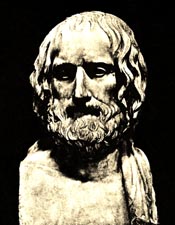Electra
, translated by Theodoridis, G., (contributor-contact-email)
Euripides’ Electra, a Greek tragedy from the mid-410s BC, has an uncertain chronological relationship with Sophocles’ play of the same name. The plot centres around the aftermath of the Trojan War, as Agamemnon, Mycenae’s king and father to Electra and Orestes, returns home. Contrary to his expectations of a hero’s welcome and a faithful spouse, he finds his wife Clytemnestra has taken Aegisthus as her lover. Together, they trap and murder Agamemnon, with Aegisthus then claiming the throne.
Agamemnon and Clytemnestra’s children, Orestes and Electra, are separated following their father’s death. Orestes is taken to Phocis by a loyal servant and raised by King Strophius, while Electra remains in Mycenae, enduring a troubled upbringing and longing for Orestes to return and avenge their father. Electra, to prevent her from bearing a noble heir who might challenge the usurpers, is forced to marry a peasant and live a life far removed from her royal upbringing.
The play follows Electra’s and Orestes’ subsequent vengeance of the murder of their father. Electra, living as the wife of a poor farmer, has a chance meeting with her brother Orestes. At first, they do not recognise each other, but following realisation of their blood relationship, they begin to plot to avenge their father’s murder. Orestes kills their mother’s lover, Aegisthos prior to their shared killing of Clytemnestra. The two are then filled with grief and guilt. As they lament, Clytemnestra’s deified brothers, Castor and Pollux emerge and inform Electra and Orestes that while their mother’s punishment was deserved, their matricide was still a shameful act. They then instruct the siblings on the necessary steps for atonement and cleansing of their souls.

Theodoridis, G.,
Support Open-Access:
Your contribution keeps our classical translations available to all. Every dollar helps support classics education and funds the expansion of our catalogue. Value what we do? Donate now.
File Downloads:
© Copyright, All Rights Reserved. This work may be freely reproduced, stored and transmitted, electronically or otherwise, for any non-commercial purpose. Conditions and Exceptions apply.